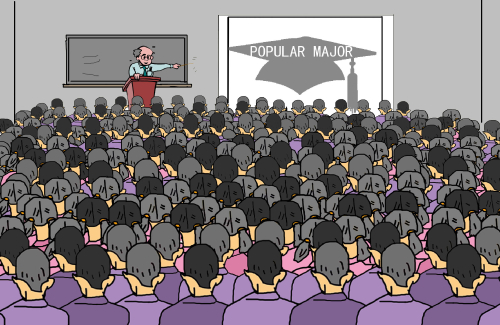 |
|
(LI SHIGONG) |
Recently, the Ministry of Education released a list of the 15 undergraduate degree programs with the lowest employment rates in China over the past two years. The list includes many majors that are popular with college students, such as e-commerce, broadcast and TV directing, acting, musical performance, animation, marketing, tourism management, art design and more, throwing universities that are busy adding new degree tracks and expanding student recruitment to fill the departments of these majors into a state of embarrassment. Students, hopeful of finding good jobs by enrolling in these highly touted programs, are now disappointed to learn that they risk higher chances of unemployment when graduating from college.
Some observers believe the majors offered at higher education institutions should be based on social demands and a school's funding and resources. Universities, they argue, are supposed to look toward the future needs of society and take responsibility for their students' education. Thus, planning the curriculum for each and every major should not be undertaken lightly, and not every school should necessarily emulate others by adding new majors.
However, others believe that a prospective employment rate is not the only measure by which to judge a degree's worth. For example, despite the difficulty of finding a job in many undergraduate programs, these programs are still necessary in larger society. Following are excerpts of opinions concerning the issue:
Market needs first
Xu Juan (www.people.com.cn): When planning to offer a new major, universities must first have sufficient educational resources, including qualified teaching staff and classroom equipment and space, to name but a few. Lately, quite a few universities have added as many as 10 new majors to their ranks in just one year. Observers can't help worrying whether or not these schools are operating beyond their capabilities.
Without a normal "retirement system" for majors, outdated majors continue to recruit students. Similarly, when currently popular majors become obsolete in several years' time, students pursuing these degrees will find themselves in extremely difficult conditions in terms of job hunting.
In most developed countries, colleges have to take market needs into account, and they are also under strict management by education authorities, which provide information on employment prospects and thus guide the programs on offer. Sometimes companies cooperate with universities in terms of student recruitment and internship or job opportunities. On occasion, students are even allowed to submit suggestions for majors or coursework.
In China, universities tend to have the final say on degrees and their curricula, and this detachment from market needs has inevitably resulted in high unemployment rates in specific areas.
Shi Jingtao (Jiaozuo Daily): When college graduates are faced with the ever-growing pressures of employment, it's necessary to adjust how undergraduate degree programs are designed in order to make job-hunting easier for students. However, this does not mean that universities are right to rush in the opposite direction, suddenly offering several new majors that enjoy high employment rates.
Low employment prospects among college graduates can be attributed to two things: expanding student recruitment efforts over the last decade and structural problems in the labor market. Even with the majors that are most saleable in the job hunt, employment rates will not always necessarily be ideal. Labor surpluses exist everywhere, most especially in cases of increasing numbers of students flocking to oversubscribed programs that promise better chances of employment. No matter how favorable a degree is in the labor market, when so many people are competing for jobs, any major can come to carry a major risk of unemployment.
| 